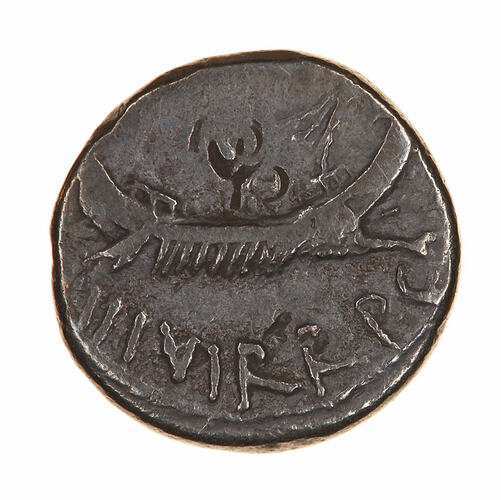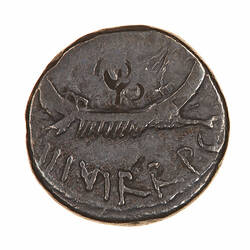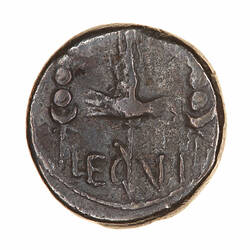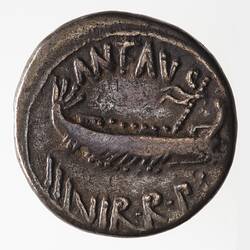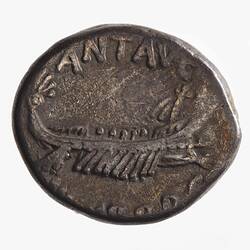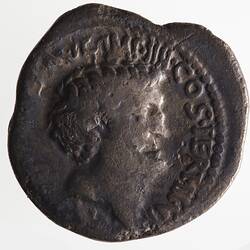Summary
Denarius, issued by Mark Anthony, 32 BC
Imperatorial Period
Minted by Moving with Mark Anthony, perhaps at Antony's winter headquarters in Patrae (Greece)
Obverse Description
A ship being rowed to the right; above (off flan) [ANT AVG] (abbreviating: Antonius augurus); below, III VIR R P C (abbreviating: Triumvir rei publicae constituendae; translation: One of Three Men for the Restoration of the Republic)
Reverse Description
A Roman military eagle (aquila) between two standards; below, LEG VI
Edge Description
Plain
Significance
This coin was part of a very large issue by Mark Anthony before his final confrontation with Octavian at the Battle of Actium in 32 BC. The coins were produced at a mint travelling with the general perhaps at Antony's winter headquarters in Patrae (Greece). Mark Antony used these coins to pay his legions and fleet. However the number of coins needed strained the available amount of silver and forced a lower silver content be used in their production than was used in standard denarii of that time. These debased coins tended not to be hoarded but remained in circulation well into the period of the Roman Empire. Like the examples in the museum's collection these coins are often found in worn condition and with bankers' test marks (eg above the ship on the obverse of this coin).
This coin celebrates the Sixth Legion. "Levied by Caesar in 52 BC, Legio VI (after 40 BC, Ferrata "Ironclad") fought with him in Cisalpine Gaul and against Pompey at the Battle of Pharsalus in 48 BC. The legion almost was annihilated the next year when, pursuing Pompey to Alexandria (Civil War, III.106), it was besieged by the forces of Ptolemy XIII. (The throne was secured for Cleopatra when Caesar was relieved by Mithridates of Pergamon, who allied with him at the Battle of the Nile.) But only two cohorts (fewer than a thousand men) of Legio VI survived to fight in the Battle of Zela (47 BC) against Pharnaces II, where they were instrumental in victory (Alexandrian War, LXXVI). Following the assassination of Caesar in 44 BC, the legionaries, who then were colonists in Arles, was reformed by Lepidus and passed to Antony the following year." http://penelope.uchicago.edu/~grout/encyclopaedia_romana/miscellanea/numismatics/antony.html
Legion VI was with Anthony in Greece before the Battle of Actium. Octavian was the victor and became the first Roman Emperor, known as Augustus. Legion VI was not disbanded, Augustus stationed it in Syria. The Legion remained in the East and still existed into the second half of the Third Century AD. For further detail of Legio VI Ferrata see http://www.livius.org/le-lh/legio/vi_ferrata.html
More Information
-
Collecting Areas
-
Acquisition Information
Transfer from National Gallery of Victoria (NGV), 15 Mar 1976
-
Date Issued
32 BC
-
Issued By
-
Denomination
-
Material
Silver
-
Classification
-
Category
-
Discipline
-
Type of item
-
Shape
Off round
-
References
Crawawford 544/19
[Book] Crawford, Michael H. 1974. Roman Republican Coinage., 539-40 & 744 Pages
[Book] Crawford, Michael H. 1985. Coinage & Money under the Roman Republic., 255 Pages
